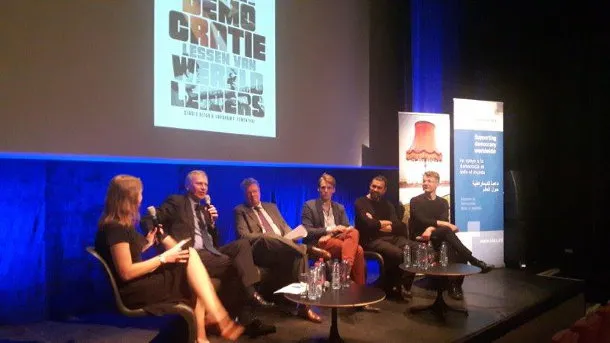
The Office of International IDEA to the European Union (EUO) in Brussels launched French and Dutch versions of Democratic transitions: Conversations with world leaders at two separate events.
A more holistic, contextual and grass-roots approach
The EUO launched the French book version, “Transitions démocratiques. Conversations avec des chefs d’État” at Librairie Filigranes on 12 May. The panelists made a strong case for “more home-grown” democratic transitions, and on firming up the democratic credentials of the West.
The Secretary-General of International IDEA Yves Leterme, Deputy Prime Minister of Belgium Didier Reynders and Ambassador Pierre Vimont, former Secretary-General of the European External Action Service (EEAS) and “Ambassadeur de France”, took part in a panel discussion. The panel was moderated by Ramona Coman, Director of the Institute for European Studies at the Université Libre de Bruxelles (ULB).
The head of the EUO, Andrew Bradley, emphasized the key role of citizens in governance and the importance of democracy support in his introductory remarks: “There is no single path to democracy, it is home-grown, constantly evolving and owned by the people”.
Leterme, focused on the lessons learned from the experiences of the 13 political leaders and concluded his remarks by quoting Mohamned Moncef Marzouki, former President of Tunisia, by referring to the intrinsic link between authoritarian rule and the rise of terrorism, and the delicate connection between security and civil rights and liberty in the new world context.
In their respective interventions, Reynders and Vimont focused first on the democratic deficits within the European Union, and the challenge of advocating democratic values beyond the borders of Europe at a time that EU democracy is perceived to be receding. Reynders urged the West to abandon the prescriptive approach, and to opt for a more holistic, contextual and grass-roots approach in supporting democratic transitions worldwide.
Vimont concluded the event by calling for more creativity in ‘democratic diplomacy’ towards the EU’s neighbourhood: “Don’t use the same concepts, but adapt them to the needs of the citizens. Although there is a certain willingness to learn from western experiences, reformers prefer to build democracy on the basis of local realities, history and institutional structures.”
Designing a vibrant and legitimate democracy
The panel for the evening event, ‘Avant-garde in politics: Designing Democracy,’ brainstormed on innovating concepts for future democracies. The remarkable focus of architect David Mulder on how the design of parliaments worldwide reflect the democratic vision, and to a certain degree, the democratic system of a country, coloured the wide range of ideas put forward during the event.
The panel was composed of Leterme and the following people:
- Belgian author, activist and co-founder of stRaten-generaal, Manu Claeys
- XML Architects and Sandberg Instituut of the Netherlands, David Mulder
- Professor of Legal Law, University of Leiden in the Netherlands, Bastiaan Rijpkema
- Chief of Cabinet to Belgian Deputy Prime Minister and Minister of Development Cooperation Alexander De Croo,
- Ambassador Peter Moors.
The debate and exchange of views among panelists and with the audience were moderated by Ann Peuteman, editor and journalist at Knack, a prominent political and cultural weekly magazine in Belgium.
Leterme presented the book “De weg naar democratie. Lessen van wereldleiders”, and referencing those experiences of the 1990s, to articulate perspectives on the future of democracy.
Claeys, provided his vision for the future of participatory democracy – which he prefers to call “vibrant democracy”. He stated that the efficiency of democracy is hampered when the legitimacy issue is neglected in a democracy.
Rijpkema, author of the book “Weerbare democratie”, argued that democracy can take many forms, on paper and in reality. The path to democracy is custom-made and democracy should never be taken for granted. The credibility of democracy as a ‘dominant’ form of governance worldwide is questioned and the West should tackle the flaws in domestic democracy models.
Moors emphasized the importance of democracy support in official development assistance and cooperation programmes. The Belgian Government believes that democracy and the respect for human rights contribute to peace, stability and sustainable development. To this end, democracy and human rights should be the basic pillars of any development policy.
The debate following these interventions focused on the necessity to renew and revive Western democracy by taking into account new role-players, who are occupying the increasing vacuum and space between citizens and the classic political representation.
The event was held at BOZAR Centre for Fine Arts, a major political and cultural institution in Europe.



